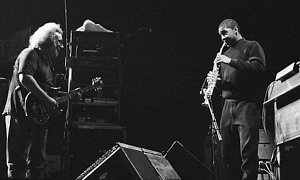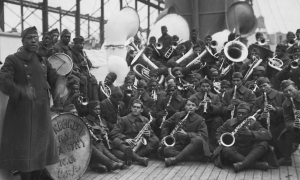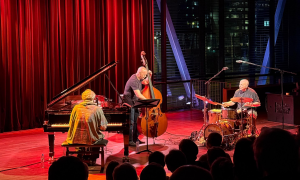Home » Jazz Articles » Book Excerpts » Ode to a Tenor Titan
Ode to a Tenor Titan
 By early 1986, Michael began formulating plans for his long-overdue solo debut. He was 37, a universally respected figure and acknowledged 'monster' player admired by fellow musicians from the pop, rock and jazz worlds. He had ridden to fame through the '70s with The Brecker Brothers and blossomed into an accomplished composer in the '80s with Steps Ahead, the preeminent fusion band of its time. Now at the peak of his game, four years clean and sober, it seemed like the right time to make his move. And yet, he had some apprehension.
By early 1986, Michael began formulating plans for his long-overdue solo debut. He was 37, a universally respected figure and acknowledged 'monster' player admired by fellow musicians from the pop, rock and jazz worlds. He had ridden to fame through the '70s with The Brecker Brothers and blossomed into an accomplished composer in the '80s with Steps Ahead, the preeminent fusion band of its time. Now at the peak of his game, four years clean and sober, it seemed like the right time to make his move. And yet, he had some apprehension. As his wife Susan recalled, "He was doing Magnetic with Steps Ahead and there was some trepidation about going out on his own. Of course, Mike had already made the leap away from Randy to do Steps Ahead. And that was sort of a big step... no pun intended. But I think he was more concerned whether he could do it all. Could he write all the music? Could he be a bandleader? But he never expressed any apprehension outwardly, so it wasn't like he was going to bed saying, 'Oh, I'm so worried that I'm not going to...' Mike wasn't like that. Mike was the kind of person where it was always an inside job for him; he did it all inside his head. You didn't see him nervous, and he wasn't all that forthcoming about it anyway.
"So he was concerned but he wasn't apprehensive to the point that it would stop him," she continued. "On the contrary, he was really excited about his first record. And as far as the music, he was very entrenched and embedded and loved it so much that it was constantly going on in his head. Constantly. So it was an exciting time for him." Michael was also being urged to branch out and go solo by Darryl Pitt, who had become his manager in late 1985 and had also acted as a conduit between Elektra Records' Bob Krasnow and Steps Ahead on the Magnetic project. "They didn't have a manager at that moment, so the responsibility kind of fell in my lap," he recalled of that interim phase. "Things at that time were kind of loosey-goosey with the group, so I tried to help bring some order to it."
Pitt also floated the idea of marketing Steps Ahead in a new way that went against the grain of established jazz protocol. As he recalled, "What I wanted to do with the group was, 'Let's make it more showbiz. Let's have lights and cue up some music before they take the stage and that sort of thing.' I wanted to make it a more fun experience for everyone."
"I remember getting very angry with Darryl," said Jerry Wortman, who worked as Steps Ahead's road manager at the time and later became Michael's road manager. "He started this idea of t-shirts and merch tables (tables selling merchandise at gigs) and my attitude was, 'These guys don't need this stuff. These are the greatest jazz musicians in the world.' I didn't understand show biz at that time but I learned a lot from being around Darryl and began realizing that if an artist has a name and is able to make some money, you should do whatever you can to promote that artist, without being ridiculous."
Beyond the show biz aspects of the group, there were also business issues with Steps Ahead that needed to be addressed. Part of that involved getting Michael to be the deciding vote on band decisions between himself, Mike Mainieri and Peter Erskine. "The issue with Mike was that he was such a sweet, sweet man and he would just go with whatever direction the winds would blow at that moment and basically agree with people," said Pitt. "And if people had differing opinions, he would agree with both of them, which became a burden for me as a manager. Peter Erskine had a point of view, Mike Mainieri had a point of view, and Mike Brecker was in the middle with the deciding vote, but he would invariably agree with both of them. And it became a problem because things weren't getting resolved. "Finally, I had to say, 'Mike, you have to break the tie. It's wonderful to have three people calling the shots so there's a majority decision that's being made, but that's not happening here. Break the tie.' Well, I broke the tie, and it was in favor of the Mainieri camp. And that was the catalyst, I believe, to Peter leaving the band."
Shortly after Magnetic was released, Pitt began urging Michael to compose more. "Mike had two songs on Magnetic and collaborated on a third," said Mainieri. "And finally, Darryl really put his foot down and said, 'OK, Mike. It's time to write some stuff.' Then when Elektra dropped us in 1986, Darryl said to me, 'I'm going to get you guys a deal at GRP. I'm gonna get Steps Ahead a deal and I'm going to get Michael a solo deal.' We had a meeting with Larry Rosen at GRP and it turned out he wasn't interested in Steps Ahead. He said something to the effect of, 'I have too many bands, but if you're going to start another band with another label, Michael can't do it because I really want to present him.'"
Though Michael was initially hesitant to leave Steps Ahead and go out on his own, Mainieri encouraged him. "I said, 'Mike, it's time that you present your solo work. You need to go out.' We were at the end of whatever it was anyway. Peter had left the band. And now Steve Smith was in the band with Mike Stern on guitar and Darryl Jones on bass. We had just done that one little tour with that lineup and I was feeling like I needed a break. I had a chance to build a recording studio so I just told the other guys, 'I don't want to be on the road for a while.'"
That opened the door for Michael to commit wholeheartedly to a solo career. "He was really coming alive on so many levels," said Mainieri. "He started writing more and that really took root. I had always been on Mike about writing more. I knew it was there in him, it was just a matter of prompting him. He was that exotic flower that a botanist finds in the woods. It's one of a kind, so you just have to be patient and let it grow slowly."
Going solo would also mean a distinct change of mindset on Michael's part. As Wortman said, "Mike really started getting frustrated being a hired gun for studio sessions. He felt like he had crossed into this zone where it was kind of like whoring out a little bit. He didn't quite put it like that but it was a sense that he just wasn't inspired by that kind of work anymore and he felt like, 'It's time to step up.' He had other things in his head he wanted to do."
As Michael's manager, Pitt was key in helping Michael make that transition. Taking the reigns of Michael's solo career was personally satisfying for Pitt, but it also represented some challenges. "Among my first tasks was to disabuse about a half dozen record labels that Mike would be making his first record for them," he recalled. "In what was classic 'nice guy Mike' style, he assured every major label head that inquired—and they all did—that he would make his first record with them. Mike had promised CBS. Mike had promised Bruce Lundvall at Blue Note. Mike promised Warner Brothers. Mike promised ECM. Mike promised everyone that he would make his first record with them. So I had some cleaning up to do. I was the guy who had to say 'no' to all of those labels.
"My work as Mike's manager started with that," Pitt continued. "And that became the template for our lives together, where I was the bad cop and instantly people hated me as a result of my having to be the bad cop. But I loved being Mike's bad cop. I loved it!" Pitt would become an unrelenting pitbull on his new client's behalf, negotiating tough deals while always keeping an eye toward the big picture of Michael's career. With an unapologetically dogged style that could be described as 'effectively tenacious,' Pitt was reviled by some that he had business dealings with. As one record executive wrote in a letter upon learning that Brecker would be leaving the label: "Mike, I want you to know I am so sorry. I love you. I'm so sorry we're going to be losing you. But the one thing I'm really glad about is that we'll never have to see Darryl Pitt again."
There is no denying that Pitt's methods were brusque, but they also greatly benefitted his client, who over time would also become a dear friend. As Wortman noted of Darryl and Michael, "They had a completely special, unique relationship that went deeper than just the business. But business always got taken care of."
In 1986, Pitt secured a record deal for Michael with MCA's Ricky Schultz, who had directed the label's re-entry into the jazz market via the newly re-launched Impulse! Records imprint—the same hallowed label that John Coltrane had made some of his most potent recordings for. "The notion of getting Mike a record deal was incredibly easy, and the reason why was because everyone wanted Mike to be able to record for him," said Pitt.
Michael's best friend, keyboardist-composer Don Grolnick, was enlisted to produce the saxophonist's self-titled debut, which featured an all-world band of guitarist Pat Metheny, bassist Charlie Haden, drummer Jack DeJohnette (reprising their role together from Metheny's 80/81) and pianist Kenny Kirkland, who had previously played alongside Michael on Kazumi Watanabe's 1982 album To Chi Ka, Peter Erskine's self-titled 1982 debut, Franco Ambrosetti's 1983 album Wings and his 1985 followup Gin and Pentatonic, as well as on Steps Ahead's 1986 album, Magnetic. Grolnick also contributed three superb compositions in "The Cost of Living," "Nothing Personal and "Original Rays." As Michael said, "I had the luxury of having Don Grolnick as a producer. He was my closet friend and my musical cohort. He had a keen eye for detail and he had the ability to see the big picture as well."
Added Susan, "Mike really trusted Don. He trusted him not only as a friend but as a steward of the music. Because Don was such a great composer and was so thoughtful and so thorough that Mike felt very safe with him, not only to explore different types of music and different arrangements, but that it would come out OK. Because Don really held himself and others to a very high degree of excellence. And Michael appreciated that because he was the same way. Don was more stringent about the rules but Mike held himself to that same very high degree."
Grolnick's relationship with Brecker went back to their days together in Dreams during the early '70s and through a five-year run with The Brecker Brothers as well. "They were both a little quirky in the same way," said Susan, "and they talked for hours at a time on the phone. They were just really good friends and they were both so funny. I mean, Don was clearly, hands down, one of the funniest people I've ever met. And Mike was a close second. I mean, Mike could make me laugh 'til I'd cry. Both were very dry, very witty. All Don had to do was lean over and say something completely deadpan and I'd be in tears laughing. I actually had to stop eating food with Don, any dinners, because once he made me laugh so hard on the Upper West Side that I threw up in the restaurant. He was such a funny man."
Engineer James Farber, who had worked on 1983's Steps Ahead and the group's 1984 followup, Magnetic, was brought in to work on Michael Brecker, which was recorded at the Power Station Studio A in December of 1986. Farber recalls getting the word about the project via phone message from Mike. "I was in Chicago visiting a friend when I checked my phone machine and Mike had left a message: 'I'm going to make a jazz record!' And I was like, 'Wow, this is so great. It's really about time.' And of course, he got this super band. And the album became a classic."
Farber offered some insights about the working dynamic in the studio between Michael and producer Grolnick on that first Brecker album. "They were brothers. Don was Mr. Instinctive and he always made Mike feel so relaxed. Mike would sort of get a little nervous about things, which you wouldn't expect. But the fact that he went all those years with The Brecker Brothers and Steps Ahead and never made his own record until the age of 38... the expectations alone would naturally add some stress to the situation.
"But Don was kind of a guru," Farber continued. "And his sense of humor was so disarming. Don was the voice of reason, of not overthinking and not overdoing and not getting too technical or getting too obsessed with fixing things. Don was the earthy guy and he kept certain of Mike's instincts in check. For instance, Mike might get a little tunnel visioned about some little technical thing or something and Don would always give it some perspective. That's something that he always offered."
In terms of content, Michael was clear from the outset what direction his solo debut would take. Said Wortman, "In the past, Mike had always been so torn between what he was going to do for his first album—a fusion-y Brecker Brothers-type record or a jazz record. He was always toying with that notion. Then after he finally made that first record for Impulse! I distinctly remember him calling me and saying, kind of mischievously, 'Guess what? I made a jazz record.' And it was such an amazing record. Kenny Kirkland, who was my roommate at the time, told me that it was one of the greatest honors of his career to play on that record." "That first record was a big record for him," Susan conceded. "That really set the tone for the rest of his career." From the glorious, gospel-tinged shouts from Michael's horn on the album's opener, "Sea Glass," to the all-out burn of "Syzygy" (featuring a Trane-Elvin-inspired, whirlwind sax-drums breakdown with Jack DeJohnette for the first two and a half minutes of the track) to Don Grolnick's "Nothing Personal" and the exhilarating EWI showcase, "Original Rays," Michael Brecker surges with energy and ideas. And for exquisite nuance and grace, there's Grolnick's melancholic ballad "Cost of Living," featuring a remarkable bass solo by Haden which Michael proclaimed as "one of the highpoints of the album, for me." Michael's powerfully expressive, keening tenor solo on that moody Grolnick requiem, along with his extended solo tenor intro for the first two and a half minutes to "My One And Only Love," stand as other high-water marks of his impressive debut as a leader.
In an interview I did with Michael for the June, 1987 issue of Downbeat (a cover story entitled "New Axe, New Attitude"), he expounded on his self-titled debut, the significance of recording on Impulse! and his current fascination with the EWI: "This year I felt ready to make a record under my own name, probably for the first time in my life. I had always shied away from it previously or had worked in collaborative-type efforts, either with my brother Randy or with Mike Mainieri and Peter Erskine. I guess I never really felt that I merited doing an album. I felt afraid to do it, really. But the feeling that I wanted to do something took hold this year, followed by various feelers from different record companies. So I was approached by Ricky Shultz at Impulse! Initially, it scared me, just the aura of Impulse! Well, not scared me—I was awed by it, considering the rich history of the label—Trane, Sonny Rollins and everybody.
"And we talked about doing a jazz record, which is really what I wanted to do," he continued. "So I started batting around in my mind certain rhythm sections—people that I wanted to play with, who I felt would really create the right musical environment. I had an association with Pat, Charlie and Jack from years back, beginning with Pat's record 80/81. We subsequently did a tour, which opened up a door for me. And it's remained opened. I just hadn't really had a chance to pursue that type of playing since then. I guess I hadn't taken it quite as far as I wanted. I wanted an opportunity to take it further, particularly with those guys—and with Kenny Kirkland, whose playing I admire very much. It's a way of playing where there's a lot of space, where it's open and it just seems like the harmonic and rhythmic possibilities are infinite. And there's a warmth that the four of them are able to generate that's very appealing to me. Really, all four of them almost transcend their instruments. They play with such musicality and originality that they transcend the difficulty or the limitations of their instruments."
Regarding his fascination with the EWI, Michael added, "It's an instrument unto itself—very different from taking a sax and electrifying it and expecting it to sound good. The fingering positions are basically identical to a saxophone, the main difference being it's touch sensitive. So there's no moving keys, which is hard to adjust to at first because saxophone players are taught to rest their fingers on the keys. But on this, it would activate a sound if you did that. So you have to be very careful what you touch. It requires a lot of accuracy both in fingering and tonguing. The horn is attached to a suitcase-type container with all the electronics, and there's a set of eight rollers on the back of the instrument for making octave leaps. Whatever roller I'm touching determines the octave I'm playing in. So by rolling your thumb, you can making incredibly quick octave leaps. And the unique thing is the warmth of the sounds you can get. You can make some gorgeous acoustic-like sounds— alto flute, violin, shakuhachi, a harmonica that sounds like Stevie Wonder. They're organic sounds instead of cold, brittle synthesizer sounds. It's really a fascinating instrument."
Michael's approach to programming sounds for the EWI revealed his scientific acumen, an intrinsic quality going back to youthful days with his chemistry set down in his parents' Cheltenham Township basement: "For me, the instrument is wide-open. The only limit is your imagination. It's opened up new vistas for me, yet I'm not putting my sax on the shelf. If anything, I've been playing the saxophone more than I ever did. Having the EWI has kind of freed me up, and yet, somehow for me, one can't exist without the other. I enjoy synthesizing and making sounds, blending sounds, dealing with wave forms and experimenting with timbres. And after playing around with that stuff, I get a craving to get back to playing an acoustic instrument like the tenor. But I play the EWI because I enjoy it. It's fun. I've always, on some level, been fascinated by electronics. I went through a period about five years ago where I seriously got into video games. So I just took that energy and applied it to this. I guess I got tired of wasting quarters."
In discussing the very expressive nature of his playing throughout Michael Brecker, he also touched on the spiritual aspects of making music: "It's something that I've always felt able to summon, particularly moreso in the last five years than ever before. That's also probably because I've been in touch with myself emotionally to a much greater degree in the past year or so, but it really takes being with the right musicians to bring it out in a musical way. It's not something that I've developed intentionally, but I think I've become more comfortable with it lately—more in touch with my own feelings. That has had a huge effect on my playing.
"But the emotional part, really, has a life of its own," he continued. "It's almost like the feelings get in touch with me rather than me getting in touch with them. And it just comes out in the music. It sounds kind of pseudo-spiritual, but I feel when I'm really at my best that I'm not really playing at all. It's almost like it takes on a life of its own. And those moments seem to be coming more often now than they used to. It's a very exhilarating feeling but it seems to be something that, at this point, I have no control over. So I just try to move forward—keep up with technique, keep listening, trying to expand and learn, play as much as possible, and just try to have a good attitude. And the rest is really—I don't know... it almost feels like I'm being played by some other force."
Following its release in April, 1987, Michael Brecker hit #1 on the Billboard traditional jazz chart on June 20 and remained there for 10 weeks. "That record came out and we could do a week at New Morning in Paris and have lines around the block for six nights, sold out," recalled road manager Wortman. "I mean, nobody does that anymore. Nobody plays more than one night anywhere anymore. We played Fat Tuesday's in New York, played the Bottom Line... all sell-outs. There was definitely a lot of momentum going for Mike at that time."
Tags
Book Excerpts
Michael Brecker
AAJ Staff
Steps Ahead
Mike Mainieri
Peter Erskine
John Coltrane
Don Grolnick
pat metheny
Charlie Haden
Jack DeJohnette
Kenny Kirkland
Kazumi Watanabe
Franco Ambrosetti
Sonny Rollins
New Morning
Paris
Comments
PREVIOUS / NEXT
Support All About Jazz
 All About Jazz has been a pillar of jazz since 1995, championing it as an art form and, more importantly, supporting the musicians who make it. Our enduring commitment has made "AAJ" one of the most culturally important websites of its kind, read by hundreds of thousands of fans, musicians and industry figures every month.
All About Jazz has been a pillar of jazz since 1995, championing it as an art form and, more importantly, supporting the musicians who make it. Our enduring commitment has made "AAJ" one of the most culturally important websites of its kind, read by hundreds of thousands of fans, musicians and industry figures every month.



























